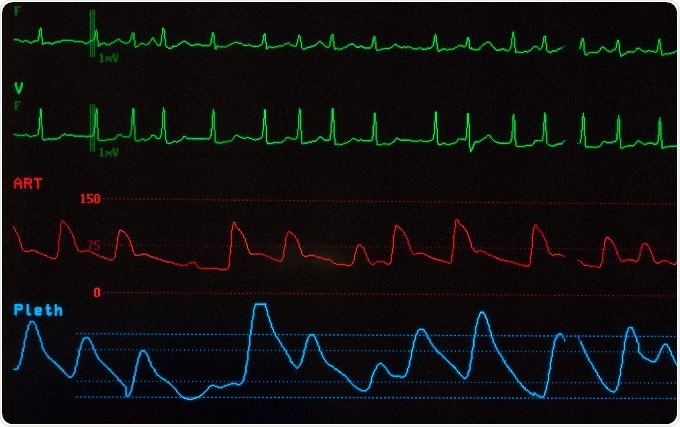Research published yesterday shows that the risk of developing an irregular heartbeat—atrial fibrillation— is considerably higher among people working more than 55 hours a week.
 Medical monitor with green lines of an abnormal ECG showing atrial fibrillation. Red line = arterial blood pressure, blue line = oxygen saturation. Credit: Teresa Otto/Shutterstock.com
Medical monitor with green lines of an abnormal ECG showing atrial fibrillation. Red line = arterial blood pressure, blue line = oxygen saturation. Credit: Teresa Otto/Shutterstock.com
Atrial fibrillation occurs when the electrical impulses controlling the regular rhythm of the heart become out of synchronization. The heart may then race or just not beat in a steady manner. Sufferers may feel palpitations, breathlessness and dizziness. However, some sufferers are completely unaware of the problem. It is a risk factor for the development of stroke.
The risk of stroke has already been shown to increase in those who work long hours. A research team from University College, London, led by Professor Mika Kivimaki conducted a prospective study to assess whether there was also an association between atrial fibrillation and work pattern. They analyzed data from over 85,000 working men and women in the UK, Denmark, Sweden and Finland. People who worked 35-40 hours were used as the control group.
A total of 4,484 people were working 55 hours or more each week. None of the participants had atrial fibrillation at the start of the study.
After 10 years, there were 1061 cases of atrial fibrillation indicating that 12 in every 1000 participants had developed the condition. The figure was dramatically higher among those participants who worked ≥55 hours per week, with atrial fibrillation affecting 18 in every 1,000 people.
People who worked 55 hours or more a week therefore had around a 40% increased risk of developing atrial fibrillation compared with those who worked 35-40 hours per week. This increased risk was observed even after correcting for other factors that can increase the risk of atrial fibrillation, such as age, sex, socioeconomic status, obesity, physical activity, smoking and high alcohol intake. Indeed, 90% of cases of atrial fibrillation cases occurred in people who were free of pre-existing or concurrent cardiovascular disease.
Professor Kivimaki, commented:
These findings show that long working hours are associated with an increased risk of atrial fibrillation, the most common cardiac arrhythmia. This could be one of the mechanisms that explain the previously observed increased risk of stroke among those working long hours. Atrial fibrillation is known to contribute to the development of stroke, but also other adverse health outcomes, such as heart failure and stroke-related dementia".
Although, working patterns were not reviewed during the 10-year follow-up, this study suggests that working long hours could increase the risk of developing atrial fibrillation.
Individuals who find themselves in this potentially high-risk group may wish to check the regularity of their heart beat and consult their doctor if they are worried that it is becoming irregular. The increased risk of stroke with atrial fibrillation can be addressed with blood-thinning treatments.